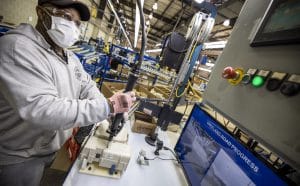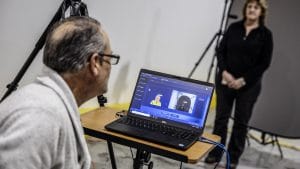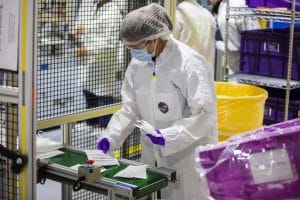
Coronavirus safety actions include required face masks for everyone entering a Ford facility. Every Ford team member will be provided a care kit.
When Ford Motor Co. restarts its U.S. manufacturing operations on May 18, company officials expect what they’ve described as a “benchmark playbook” will ensure that workers can count on being safe despite the ongoing coronavirus pandemic.
Senior Ford officials outlined their strategy during a media webinar Thursday, detailing the extensive modifications in layout and procedures that workers will encounter once they return to work on May 4 in Europe and two weeks later in the U.S. Among other things, that will mean wearing medical-style protective garments and maintaining greater distances from one another, wherever possible, along the line.
Asked if he’d feel safe enough to send his family to work at one of the plants, Ford Chief Operating Officer Jim Farley said, “Absolutely, I would feel comfortable my family coming to work at a Ford facility. Our playbook is a benchmark. I completely trust the process we have come up with.”
(Toyota reveals “flexible” plan aimed at safely starting to re-open U.S. plants.)
Like the rest of the auto industry, Ford has been hit hard by the coronavirus pandemic. The automaker earlier this week reported a $2 billion loss for the first quarter and expects to have additional losses for the April-June quarter, much of that the result of having its U.S. and European manufacturing operations shut down.

New procedures include no-touch temperature scans upon arrival. Anyone with a raised temperature will not be permitted to enter and will be instructed to visit a physician to be cleared before returning to work.
On the plus side, noted Farley, most of Ford’s factories in China have been ramping back up since late February. And the procedures put in place there have helped the carmaker come up with the playbook it will implement in the U.S.
“The key is self-validation,” said Gary Johnson, Ford’s chief manufacturing and labor officer, noting that every worker will have to complete a survey on mobile devices before reporting in and, if they show possible symptoms, they will be sent to a clinic or hospital allied with Ford to be tested. Even then, thermal imaging systems will check all employees as they come into the plant to spot those who might not have recognized any symptoms yet.
Upon reporting in, each worker will receive a kit with medical-style personal protection equipment, starting with masks that all employees will have to wear. Those who might be working closer than six feet to another line worker will also need to wear protective safety glasses or a face shield.
Johnson said he is confident that the gear will be enough to prevent even an asymptomatic carrier of the coronavirus from infecting another worker.
(GM moving forward with preparations to restart plants.)
Ford has created a playbook “to make sure wherever you are in the world, no matter where you are working, you will have access to a safe work environment,” added Kiersten Robinson, the automaker’s chief human resources officer.

Face masks are required for everyone entering a Ford facility. Every Ford team member will be provided a care kit.
Meanwhile, the automaker has also been working with 1,500 of its U.S. suppliers to ensure they also meet rigid safety standards. Automotive analysts have warned that an outbreak at a key supplier plant could cripple the industry.
The startup of operations will likely be slow, said Johnson, and it isn’t clear exactly how long it will take for the automaker’s factories to be churning things out at pre-pandemic rates.
Separately, Ford is working out plans to bring back the rest of its workforce, including designers, engineers and other white-collar employees. The carmaker had about 1,000 of them working remotely before the pandemic, with the number quickly surging to 125,000. Those employees, said Robinson, likely won’t start reporting back to Ford facilities until closer to the end of June.
General Motors is also readying to restart production as well. As part of that process, the company is issuing a literal playbook to returning employees to outline new safety measures and guidelines to remain safe, many of which mirror the efforts made by Ford and Toyota.
(Coronavirus crushes Ford, resulting in Q1 loss of $2 billion.)
The restart of the U.S. auto industry has gone much slower than many had originally anticipated in mid-March when the extent of the pandemic became apparent. Several automakers, including Kia, had hoped to resume production this week, and some are still targeting next week. But many, including Volkswagen, Ford, General Motors and Fiat Chrysler, are now looking at mid-May at the earliest.
